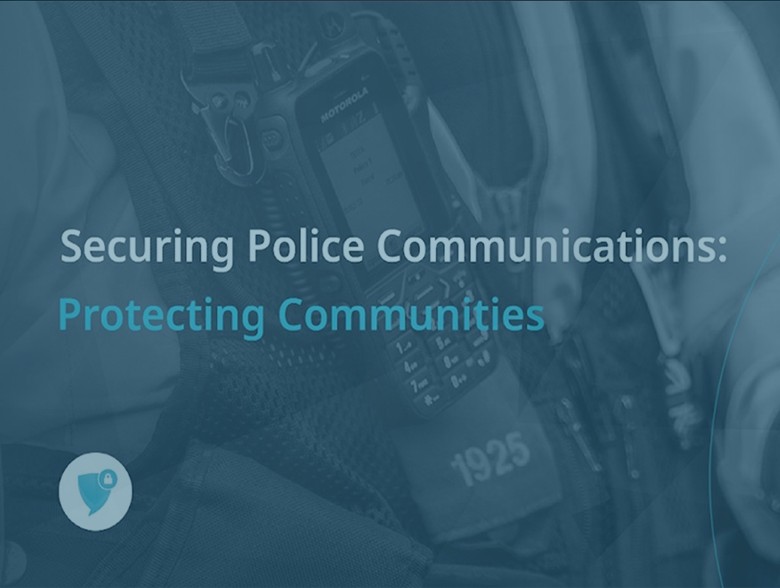By Nicole Allen, Senior Marketing Executive at Salt Communications
Probably now more than ever, secure communications are crucial for Policing and the communities they serve.
The ability to successfully communicate with co-workers, superiors, other departments and jurisdictions, and the court systems is essential for law enforcement and police officers if they are to fulfil their duty to “protect and serve” the communities they operate within. Having this level of secure communications throughout a police force is vital to investigate crimes sensitively and efficiently, defuse tense situations with all relevant information readily available which will in turn establish a stronger trust within communities.
The challenges Policing face when protecting communities
Police forces must communicate in a clear, succinct and accessible manner in order to be effective. The issue arises when communication becomes broken down due to using multiple different communication channels. Without a clear understanding of what methods of communications are secure and acceptable, officers will use whatever tools are most convenient, often putting crucial information at risk.
The confidential policies, updates, protocols, directives, and initiatives that are given to police officers are constantly changing. Not to mention the memoranda and communications from various departments and leadership that they are receiving, which can be overwhelming and unclear for officers to take in – in addition to being insecure. This may have long-lasting repercussions for an officer’s comprehension of specific rules and policies, which may then negatively affect civilians.
By placing a high priority on good communication in policing organisations, you will raise morale, boost job satisfaction, improve feedback, strengthen teamwork, ensure compliance and most importantly communicate securely.
How Policing can build trust with communication
In the sphere of criminal justice, the capacity to safely communicate can make the difference in critical situations. Police officers must be communicating in a safe manner to maintain order, protect citizens and obtain information that can help law enforcement apprehend criminals. Learning to communicate effectively also requires learning how to spot indicators of conflict, avoid and resolve them.
A department’s internal communication, including how officers communicate with one another, how leadership communicates with the rank-and-file, and the rules and regulations that govern how the department runs, should be one of its top priorities. If you can get this mastered and deploy an effective system, it will greatly enhance how your department operates within the community. Officers will grasp the policies and instructions from leadership more clearly if there is an effective communication system in place to receive this information. They’ll know what to do in particular circumstances and have the technology available to them to make better decisions, which will ultimately be advantageous to both the officers and the community in which they work.
Better equipped officers means a happier community
Not only is what you say and how you say it important, but also the channel in which you say it. As a result, policing personnel must be able to share various pieces of information over a reliable route. While answering a response call, it would be as easy as clicking a few buttons via a broadcast message to push out real-time alerts to all relevant groups of users. It has a central area where memos, evidence on scene, policy updates, and training materials can all be shared and accessed from a laptop, mobile device or one to the other. Ultimately this ensures trust in your community as they know their emergency call is being dealt with quickly and efficiently.
Your officers will have some of the most cutting-edge police communication technology if they can communicate through this one secure platform when out on the ground and back to base.
In order to obtain intelligence and information on current and potential criminal and terrorist activity, the police and security agencies rely heavily on their capacity to communicate in a secure and clear manner at all times. Maintaining public safety and successful policing depend on police forces and the communities they serve developing strong relationships based on mutual trust.
The effectiveness, efficiency, and engagement of communication between officers can be significantly increased by a secure communications platform that supports efficient communication in law enforcement. There will be clearer and simpler internal communication for both policing organisations to share sensitive information, aiding decision making and offering on the ground evidence, improving their ability to serve their communities.
You will always be connected to a resilient, dependable network when you need it most thanks to Salt Communication’s expertise in developing and delivering secure, robust communication capabilities. To learn more about protecting your communications for your force, you can read more on our website or sign up for your 30 day free trial.
About Salt Communications
Salt Communications is a multi-award winning cyber security company providing a fully enterprise-managed software solution giving absolute privacy in mobile communications. It is easy to deploy and uses multi-layered encryption techniques to meet the highest of security standards. Salt Communications offers ‘Peace of Mind’ for Organisations who value their privacy, by giving them complete control and secure communications, to protect their trusted relationships and stay safe. Salt Communications is headquartered in Belfast, N. Ireland, for more information visit Salt Communications.
References:
https://www.ojp.gov/pdffiles/commp.pdf
https://onlinedegrees.sandiego.edu/police-communication-important-today/
About the Author
 Nicole Allen, Senior Marketing Executive at Salt Communications. Nicole has been working within the Salt Communications Marketing team for several years and has played a crucial role in building Salt Communications reputation. Nicole implements many of Salt Communications digital efforts as well as managing Salt Communications presence at events, both virtual and in person events for the company.
Nicole Allen, Senior Marketing Executive at Salt Communications. Nicole has been working within the Salt Communications Marketing team for several years and has played a crucial role in building Salt Communications reputation. Nicole implements many of Salt Communications digital efforts as well as managing Salt Communications presence at events, both virtual and in person events for the company.
Nicole can be reached online at (LINKEDIN, TWITTER or by emailing [email protected]) and at our company website https://saltcommunications.com/


